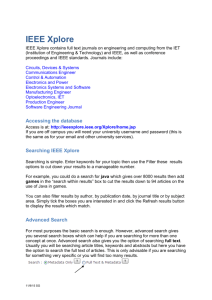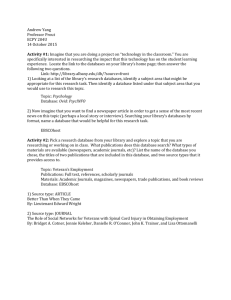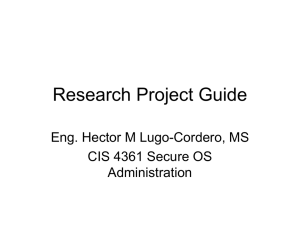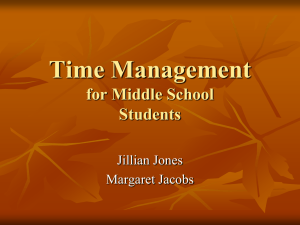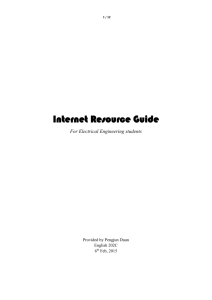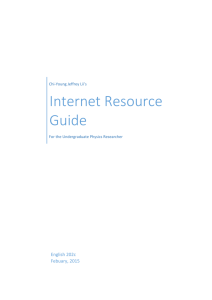Useful Resources for EE
advertisement
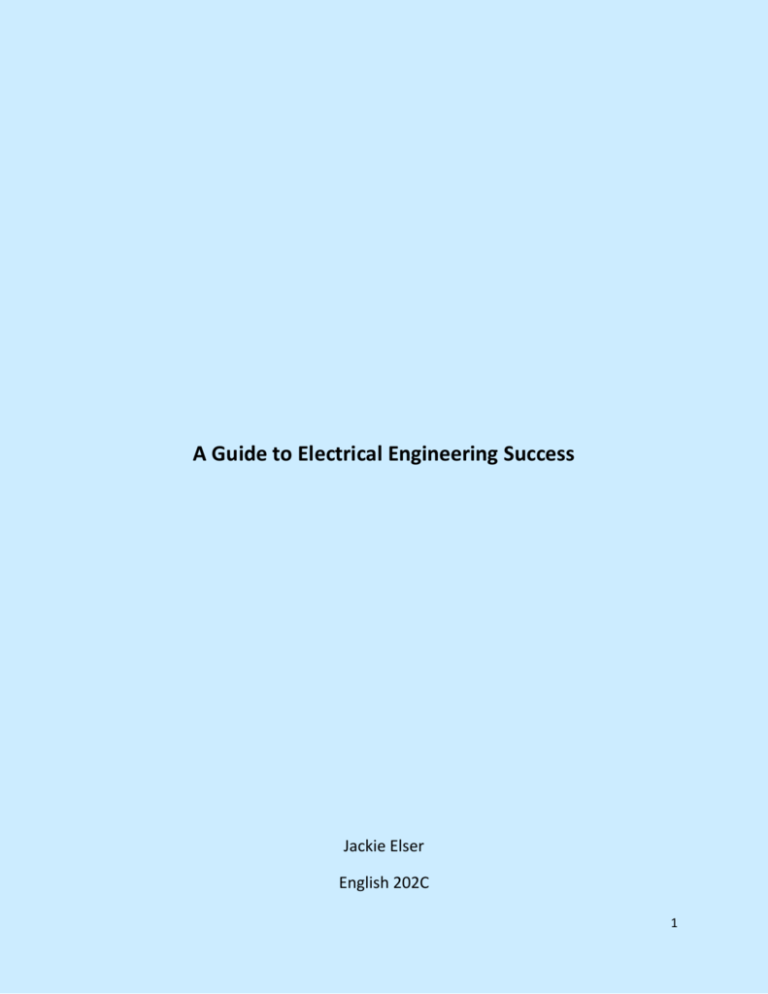
A Guide to Electrical Engineering Success Jackie Elser English 202C 1 Table of Contents: 1. Preface…………………………………………………………………………………….…. 3 a. Contents ………………………………………………………………………….. 4 b. Audience ……………………………………………………..………………….. 4 c. Assumptions …………………………………………………………...………. 4 d. Organization ……………………………………………………………..……… 4 e. Tips …………………………………………………………………………..………. 5 2. Resources ……………………………………………………………………….…….……. 6 a. Publications ……………………………………….…………………….….……. 7 i. ProQuest ………………………………………………………….……… 7 ii. Journals of Electrical Engineering …………………….………. 8 iii. A Policy Framework for the 21st Century Grid …….…... 9 iv. Science & Technology Statistics from Census ……....….. 10 b. Internet sites ………………………………………………………………..……. 11 i. IEEE Xplorer ……………………………………………….……….……. 11 ii. Defining Control Strategies for MicroGrids ………….……. 12 iii. Web of Knowledge ..……..…………………………………….……. 13 iv. Martindale’s Engineering Center.…..…………………….……. 14 2 Preface This section of the guide will help you decide if the guide will be helpfully to what you wish to accomplish. After reading the preface you will know what is in the guide, how it is organized, and what you should know before reading it. 3 Contents This guide contains links to websites and articles in topics of electrical engineering. The articles typically lean towards power systems for electrical engineering, but many of the resources would be useful to any electrical engineer. The guide is useful in finding new information on, the problems that need to be solved by engineers, and resources for helping you to solve problems in your homework. Audience This guide is appropriate for electrical engineering majors. It will be most useful to the juniors or seniors in electrical engineering, who are looking into focusing on power systems, since the specific articles I choose dealt with power systems. The information in the guide will vary and would be useful to anyone from an undergraduate to a professional level. Assumptions The reader should be familiar with electrical engineering, but does not need to be an expert. For a Penn State student this would be typically after the completion of EE 210, but some additional experience knowledge of power systems would be beneficial for understanding the article, since it is written for a professional engineer. The reader should also have a basic knowledge of the Internet, like how to access the websites or download PDFs from the websites. Organization I have organized the guide so you can easily find your way to the sections that are most interesting to you. There is a table of contents on page 2 and page numbers 4 on the lower right hand corner of each page, to help you successfully navigate through this guide. Tips Parts of this guide will be more beneficial depending on your skill level in electrical engineering. The Internet sites will be useful to any skill level in electrical engineering. The publications will be more useful to: seniors, graduate students, or professionals. 5 Resources This section contains helpful websites and publications to help an electrical engineering student in research for a paper, or for a homework problem. This section could also help a professional in the field of electrical engineering with their work. 6 Publications Index to Periodical Literature ProQuest Link to site: http://search.proquest.com.ezaccess.libraries.psu.edu/?accountid=13158 Abstract: ProQuest is a vast database of knowledge containing articles from 1682 to the present day. This database is amazing for helping you find historical data for your research. This source provides articles from many different newspapers including, the New York Times, the Los Angeles Times, the Boston Globe, the Wall Street Journal, and many others. ProQuest will search up to 39 databases that it contains, to find the information that you are looking for. This site is free for all Penn State students. Tips: Use or to broaden a search Use and to narrow a search 7 Professional Journals Journals of Electrical Engineering Link to site: http://www.jee.ro/# Abstract: To access the current edition, just click last edition. It is laid out as a magazine and opens directly to the table of contents, so you can easily find the articles that you want to read. Once you choose your article, you will be shown an abstract of the article and will have the option to download the article for free as a PDF file. The latest edition has 40 well-written articles to choose from, with a variety of sources. For a fee the website will also give a cd version of volume of the journals so you can have a hard copy. They also have a section that will give you more information about new books in electrical engineering that could be beneficial to your research. The journals range from 2005 to 2013 and are published four times a year. Tips: There is also an extensive record of archives. To choose the article you want, match the number to the left of the title with the last number in the article 13.2. Section. 8 U.S. Publication A Policy Framework for the 21st Century Grid: A Progress Report Publisher: Office of Science and Technology Policy Link to main site: http://www.gpo.gov/libraries/ Link to article: http://permanent.access.gpo.gov/gpo34510/nstc-grid-2013.pdf Abstract: The USA government is the largest supplier of publications, so it is important to know where to access their publications and how to look through them. To find the article, I searched the main site for power systems, but there are articles for every field of electrical engineering and many other fields. This article does a good job in describing how to make a more efficient and secure power grid for the future, which would help to lower costs and power outages, so it is a very important topic in electrical engineering. The publications have a broad range from very old articles to the present day. Tips: Each section has a clear title, so look for what section you want to find out more about. To search http://www.gpo.gov/libraries/ click search near the upper right hand corner of the page. 9 Statistics Science & Technology Statistics from Census Link to main site: http://www.census.gov/compendia/statab/ Link to Article: http://www.census.gov/prod/2011pubs/12statab/science.pdf Abstract: This article was found from the main site, by searching for science and technology. The census gives you a lot of great statistics, which could be used in a research paper. The census website has statistics about everything that happens in the USA. The article shows the amount of research and development funding and where the funding came from, which could be useful in a research paper you were trying to write. There is also a multitude of other information they give you that could be relevant to your research. The statistics are usually published on a yearly basis. The statistics published by the census as far back as 1940 up until present day. Tips: The census usually provides good figures that can help you easily and quickly gather information from the article. 10 Websites Directory of Information Portals IEEE Xplore Link to site: http://ieeexplore.ieee.org/Xplore/home.jsp?reload=true Abstract: This website gives a database of articles from IEEE. IEEE is, the Institution of Electrical and Electronics Engineers. The digital library has over 3 million items including eBooks, conference publications, magazines, journals, and standards. This library will be a great place to find trustworthy electrical engineering information that would be needed. The abstracts of many of the papers are free, but to view the full paper can be expensive and some of the articles can be found through the Penn State library for free. However, this is the most extensive database for electrical engineering articles. The articles from IEEE xplore go from 1872 up to today. Tips: If searching for an exact phrase, you can put “” marks around it. The page will also allow you to create your own project, which helps you keep all of the documents you need to use in one location, and add notes and tabs to the project. 11 Sample Report Defining Control Strategies for MicroGrids: Islanded Operation Link to main site: http://ieeexplore.ieee.org/Xplore/home.jsp?reload=true Link to Article: http://ieeexplore.ieee.org.ezaccess.libraries.psu.edu/stamp/stamp.jsp?tp=&arnu mber=1626398 Author: J.A Pecas, C.L. Moreira, and A.G. Madureira Publisher: IEEE Abstract: This is an example of one the many great articles that IEEE has to offer. The articles like this can be found by, searching the Penn State library eResourses for power systems. The article explains how Micro Grids or MGs, as they refer to them, are beneficial to the grid in a normal mode or during an emergency. The Micro Grid is very useful during an emergency, since it can act alone even if the power goes down all around it. Micro Grids are currently not widespread, because it can be hard to create a small grid with its own supply of power, which means power outages can affect very large areas. Hopefully in the future we will learn to create MGs more efficiently. This report should help give you a good understanding of how an electrical engineering report should be laid out. Tips: The figures can be very useful in order to figure out what they are telling you, if you start to get lost with some of the more technical aspects of the article. 12 Directory of Information Portals Web of Knowledge Link to site: http://apps.webofknowledge.com.ezaccess.libraries.psu.edu/WOS_GeneralSearc h_input.do?product=WOS&search_mode=GeneralSearch&SID=4B5M2Akf3kKGO4 b@MkO&preferencesSaved Abstract: The Web of Knowledge is a vast database, which is great for researching any scientific topic. The database contains over 23,000 scientific journals, 23,000,000 patents, 110,000 conference proceedings, and 9,000 websites. This source can help you get more of a scientific background with the physics, chemistry, or biology of your research. A scientific background is very important for any engineering research, since science is the backbone of engineering. The Web of Knowledge is free for all Penn State students. The Web of Knowledge has a broad range, containing documents from 1900 up to 2013. Tips: Use * in a word to replace an unknown letter or letters. 13 Directory of Information Portals Martindale’s Engineering Center Link to site: http://www.martindalecenter.com/Calculators4.html Abstract: This center of engineering has a list of diverse topics that you can look through. The source has over 4,200 courses, lectures, and handbooks for you to see and get a very in depth knowledge of almost any engineering subject. The center also has over 24,000 calculators to help you solve any problem you come across, and over 1,000 videos to help you further your understanding of any engineering field you need to research. There are many things from this website that could be helpful to your research. For example, if you are researching how a computer works, while you will find many articles on how specific parts of the computer operate, like the CPU or RAM, there is also a guide telling you how to build your own computer. This would help give you an understanding on how the parts go together and which parts interact with each other. This is a good website to help give you a basis for your research and help you learn a new subject. Tips: This website is a little different from the rest because it does not have a search bar, but there is an audio engineering section, an electrical engineering section, a computer engineering section, and semiconductors etc. section, that would beneficial to an electrical engineer in there research. 14
